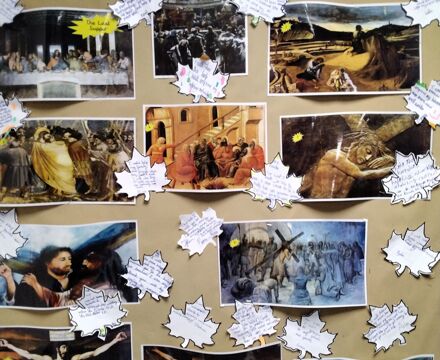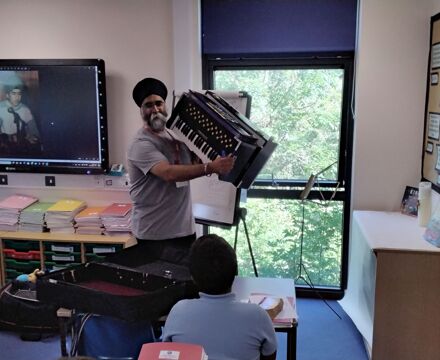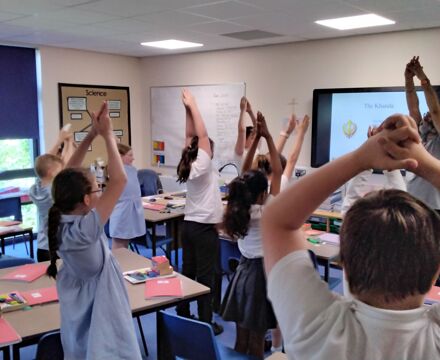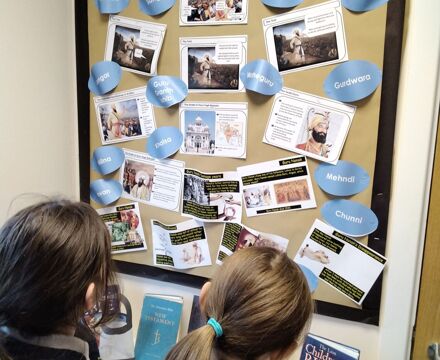- Home
- Curriculum
- Religious Education
Religious Education
Intent:
RE explores core beliefs of Christianity using an approach that critically engages with biblical texts. RE enables pupils to know about and understand Christianity as a diverse, global and living faith that influences the lives of people worldwide and as the religion that has most shaped British culture and heritage. Children are taught to make links between what they learn and how their behaviour in life’s various contexts will contribute to the building of a better world and the common good of groups and communities.
This is summarised in school’s focus on the words of St Peter: 'Each of you should use whatever gift you have received to serve others, as faithful stewards of God’s grace in its various forms.' (1 Peter 4:10)
RE enables pupils to know about and understand different major world religions and world views, their impact on society, culture and the wider world, and to appreciate the diversity, continuity and change within those religions and worldviews. RE will pose challenging questions of meaning and purpose raised by human existence and experience.
RE contributes to the development of pupils’ own spiritual/philosophical convictions, exploring and enriching their own beliefs, ways of living, thinking and values. These qualities will be linked to the world’s need for ‘good stewards’ now, and in the future.
RE will help each child to flourish and to live life in all its fullness. (John 10:10).
Religious Education is at the heart of our school ethos and core of our everyday school life. We are a Church of England School and achieved a ‘Good’ in our last SIAMS inspection. At Bulford St Leonard’s we aim to teach the Christian beliefs of the school, while also giving pupils the chance to study and understand other World Faiths. We want our children to enjoy religious education having embedded ideas and values, and believe that children should have the opportunity to question, contribute to and develop any aspect of the faiths and beliefs they encounter, in an atmosphere of honesty and respect.
Implementation:
RE is taught with the same rigour as any other subject in the curriculum. Therefore, a key component of pedagogy will be to teach and build a knowledge-rich subject. As a Church of England School we have written an RE curriculum that is taught according to the Wiltshire Agreed Syllabus, which is agreed between the Local Authority, teacher representatives and the Salisbury Diocese. This provides children with the opportunity of exploring, in a secure environment, the religious dimensions of life.
Most attention within our Religious Education is given to Christianity but the curriculum also includes opportunities for the children to gain insights into Judaism, Sikhism, Hinduism and Islam. Children are prepared to be enriched by their understanding of religion, thrive in the modern world but also to embrace difference rather than fear it.
To support the teaching, planning and assessment of RE we use the resource 'RE Today’. This resource supports the children in developing their own thinking and understanding of Christianity and other World Faiths, as a contribution to their understanding of the world and their own experience within it, as well as ensuring children are given the opportunity to develop their own beliefs and values.
Our RE curriculum map sets out the key learning that children will investigate over the course of their time at Bulford St Leonard’s Church of England Primary School. There are two main focus areas within RE learning: learning about a religion and learning from a religion.
Impact:
Standards in RE, such as delivery and outcomes for children, are monitored with the same rigour as any other subject. Children are asked to express their understanding of British and Christian values.
Pupil voice audits provide an accurate representation of the children’s perceptions of the subject. This is then used to inform future plans. The school Worship Team is represented by members from each class and allows the children an opportunity to experience leading worship and contribute to the monitoring and planning of worship in the school.
The children at BSL enjoy learning about other religions and the reasons why people choose, or not, to follow a religion. Through their learning in RE, children are able to make links between their own lives and those of others in local, national and global communities. RE serves as a central focus which provides coherence for humanities subjects especially, but for the whole curriculum and the culture of the school.
RE allows the children an insight into how other people choose to live their lives and to understand why they live that way. As such, RE is invaluable in our ever-changing world.
Right of withdrawal
Pupils’ families and faith communities have the right to encourage religious nurture of the children, fostering their faith. It is the responsibility of the school to provide Religious Education for all its pupils.
Parents have the right to withdraw their children either partly or wholly from RE. In addition, teachers have the right not to teach the subject. Our approach to RE, however, has been constructed in the hope that parents and teachers will rarely, if ever, wish to exercise their right of withdrawal.
Those parents who wish to withdraw their child from RE lessons should inform the Headteacher in writing/contact the school office at their earliest convenience.
Content and vocabulary overview (RE)
Religious Education (RE) Policy
Why RE Matters
Religion and beliefs for many people form a crucial part of their culture and identity. The UK is increasingly multi-cultural and as such our society embraces many religious beliefs and practices. We feel that it is only right that our children are equipped with the education of these religions in order to develop a love and understanding of everyone in the World so as to ensure they engage with the complexities of beliefs, avoid stereotyping and become successful Future Dreamers. The ability to understand the faith or belief of individuals and communities and how these may shape their culture and behaviour, is an invaluable asset for children in modern day Britain.
RE encourages the children to build up their skills of trust and empathy within the school community and beyond. We want to nurture our children spiritually so they become the best that they can be. We encourage our children to ask ‘Big Questions’ in RE which drives their learning, wisdom and curiosity. These questions are based around Christianity as well as other World Faiths, which allow the children to explore their relationships with God, each other and the wider World, and enables them to show respect and dignity towards others.
Religious Education in Church of England Schools
As a Church of England School we have written an RE curriculum that is taught according to the Wiltshire Agreed Syllabus, which is agreed between the Local Authority, teacher representatives and the Salisbury Diocese. This provides children with the opportunity of exploring, in a secure environment, the religious dimensions of life.
Most attention within our Religious Education is given to Christianity but the curriculum also includes opportunities for the children to gain insights into Judaism, Sikhism, Hinduism and Islam while also developing a respect for those who belong to other World Faiths.
To support the teaching, planning and assessment of Christianity we use the resource ‘Understanding Christianity’. This resource supports the children in developing their own thinking and understanding of Christianity, as a contribution to their understanding of the world and their own experience within it, as well as ensuring children are given the opportunity to develop their own beliefs and values.
The teaching of other World Faiths is supported by the resource ‘Discovery RE’. Our RE curriculum map (see below) sets out the key questions that children will investigate over the course of their time at Bulford St Leonard’s Church of England Primary School. There are two main focus areas within RE learning: learning about a religion and learning from a religion.








